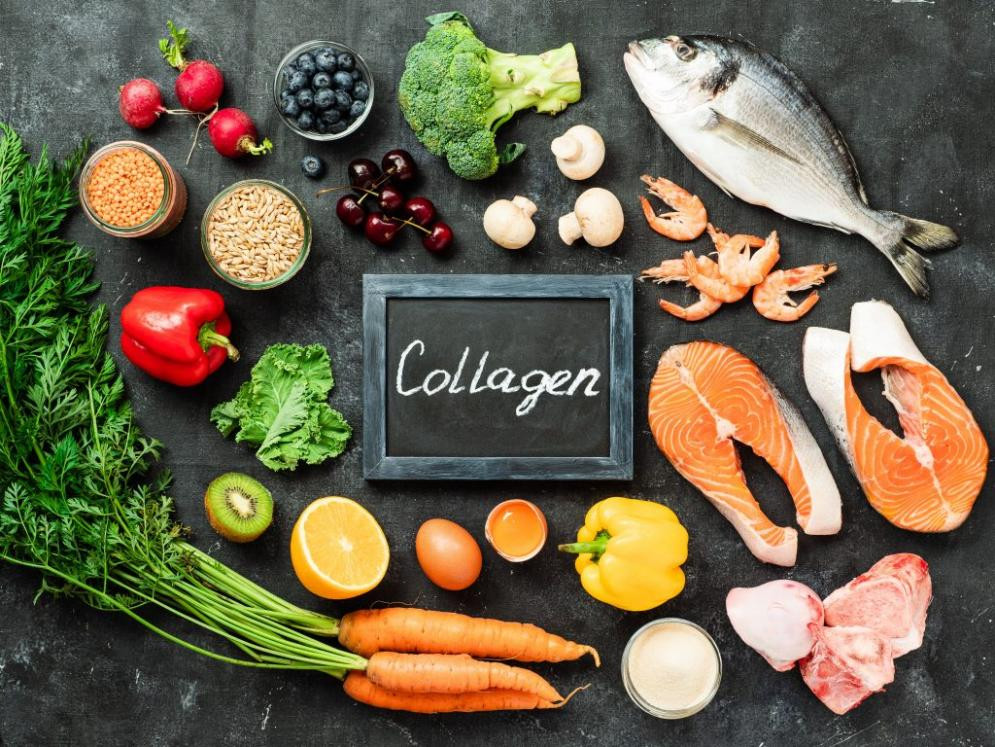How to supplement collagen for the body
Collagen is most concentrated in the dermis, creating firmness, elasticity, smoothness for the skin and healing wounds. However, with age, the amount of collagen naturally decreases so it needs to be supplemented through diet.
Associate Professor, Dr. Nguyen Thanh Ha, senior lecturer of the Department of Nutrition and Food Safety, Vice Principal of the University of Public Health shared.
Collagen plays an important role in the skin
Collagen is a type of protein that accounts for about 25-35% of the body's total protein and up to 70% of the skin structure.
Collagen is mainly distributed in the dermis, forming connective tissue cells that help create firmness, elasticity and smoothness of the skin.
Over time, collagen gradually decreases in the body. In middle age, 1 - 1.5% of collagen is lost each year, leading to the connective tissue of skin cells becoming increasingly weak and loose, causing sagging skin and wrinkles.
How to supplement collagen for the body
A good diet will help supplement collagen for the body. To create collagen, the body needs to be provided with enough protein as well as essential amino acids. In addition, vitamin C also helps increase the absorption and metabolism of protein in the body, so a diet rich in protein and vitamin C will help improve collagen.
Foods rich in protein and natural collagen are abundant in foods such as fish with skin, chicken with skin, egg whites, seaweed... Beans and nuts are also foods rich in protein and amino acids necessary for collagen synthesis.

In addition, they also provide minerals such as copper, zinc, phosphorus, calcium, magnesium which are essential for collagen production. This group includes red beans, peas, soybeans, cashews...
Foods rich in vitamin C help increase protein metabolism, act as antioxidants, prevent the formation of free radicals and stimulate the body to produce collagen to maintain skin elasticity, slowing down the aging process.
Food groups rich in vitamin C include citrus fruits such as oranges, tangerines, grapefruit; dark green vegetables (malabar spinach, cabbage, watercress, cauliflower, spinach and lettuce); colorful fruits (tomatoes, watermelon...).
In addition, some other food groups also promote the production of collagen in the body. Specifically, foods rich in Omega-3 are found in many types of sea fish such as salmon, mackerel, tuna, herring...), chia seeds, walnuts, soybeans and avocados... are especially good for the skin such as preventing dehydration of the skin, promoting collagen production, effectively reducing the risk of aging.
Shellfish with bones such as shrimp, oysters, clams... are rich in collagen, B vitamins, vitamin D and minerals which are also extremely good for the skin.
In addition to diet to overcome the aging process of the skin, you can also supplement collagen from the outside, but you should consult your doctor before using.

Avoid habits that damage your skin.
Smoke:Direct smoking or passive smoking (being exposed to cigarette smoke) reduces production and damages collagen, leading to less elastic skin, wrinkles, and slow wound healing.
Nicotine in cigarettes also constricts blood vessels near the skin's surface, preventing the supply of oxygen and nutrients to the skin, causing wrinkles, especially on the forehead, nasolabial folds and cheeks...
Eating too much sugar:Collagen and elastin fibers in the skin are greatly affected by blood sugar levels. Accordingly, when sugar levels increase, it will affect the skin by breaking down collagen, causing you to age faster.
This happens through a process called “glycation.” This is when glucose attaches to proteins in the body, including collagen and elastin (the proteins that keep skin elastic), making it difficult for the proteins to repair, leading to wrinkles and signs of aging.
Exposure to ultraviolet rays:Too much sunlight reduces collagen production and causes collagen to break down faster, causing wrinkles on the skin. Therefore, to avoid damaging your skin, you should avoid too much exposure to sunlight between 10am and 3pm when the UV rays are strongest and always apply sunscreen (SPF 30 or higher) when going out.





